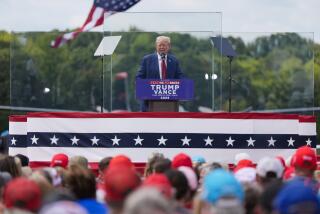Trump retreats as Pelosi blocks his move to give State of the Union address in House during shutdown

House Speaker Nancy Pelosi says no State of the Union address in Congress until government reopens.
Reporting from Washington — President Trump made a rare public retreat Wednesday after trying to defy Speaker Nancy Pelosi’s request that he delay delivering his State of the Union address in the House next week until the government is reopened.
Trump began the day on offense, sending Pelosi a letter saying he intended to give the nationally televised speech “on location” as planned, despite her recommendation.
The speaker quickly countered with a blunt refusal, making explicit what she had previously sought to convey more diplomatically. The House “will not consider a concurrent resolution authorizing the President’s State of the Union address in the House Chamber until government has opened,” she wrote him.
For a few hours, their conflicting statements threatened to escalate what already has been an acrimonious, month-old standoff over Trump‘s demand for a border wall into a balance-of-powers showdown between the heads of the executive and legislative branches.
But after a brief stare-down, Trump blinked. A visibly frustrated president said he would find some “alternative” to a speech in the House chamber before members of Congress, the Supreme Court, military leaders and foreign diplomats.
“Nancy Pelosi — or Nancy, as I call her — she doesn’t want to know the truth,” Trump said to reporters at the White House. “I think that’s a great blotch on the great country we all love.”
A speaker’s authority over the House is such that the president picked a fight he probably couldn’t win when he sent his letter.
“There are no security concerns regarding the State of the Union address,” Trump had written her, contradicting her reason for recommending postponement. Referring to her initial invitation on Jan. 3, he added, “I will be honoring your invitation … to deliver important information to the people and the Congress of the United States of America regarding the State of our Union.”
Their back-and-forth came amid increasing frustration on Capitol Hill as the partial government shutdown over Trump’s demand for $5.7 billion for a southern border wall reached 33 days with no end in sight.
Democrats argue that during the shutdown, business as usual — such as the annual State of the Union speech — cannot be conducted. Republicans say the impasse makes it especially important to hear from the president.
The Constitution does not mandate that the president deliver an annual address to the legislative branch, a tradition that began under President Franklin D. Roosevelt, but says only that he “shall from time to time” report to Congress on the state of the nation and recommend any measures to take.
Also, the House and Senate each must approve a resolution allowing him to speak to a joint session — a requirement that reflects the constitutional separation of powers between the executive and legislative branches. Historically, Congress has jealously guarded its prerogatives.
Pelosi controls the chamber and has the authority to shut off the lights or the television cameras or potentially even have Trump physically blocked from entering the House.
“The speaker controls the House chamber — and that’s lights, security, locked doors, cameras, audience,” said Rep. Gerald E. Connolly (D-Va.). “We are a separate but coequal branch of government. We are not an extension of the executive office. I would hope Mr. Trump doesn’t test that constitutional principle.”
Such a standoff between a speaker and president would have been unprecedented. One of Pelosi’s Democratic allies issued a warning to Trump on the issue: “No one in America should underestimate Nancy D’Alesandro Pelosi,” said Rep. Hakeem Jeffries of New York.
Trump, asked earlier about Pelosi’s response during an unrelated event at the White House, said, “I’m not surprised. It’s really a shame what’s happening with the Democrats. They’ve become radicalized.”
In his letter, Trump referred to Pelosi’s initial Jan. 3 invitation to speak on Jan. 29, while ignoring her Jan.16 follow-up message requesting that, given the ongoing shutdown, he either postpone the annual address or submit his remarks in writing.
“I look forward to seeing you on the evening of January 29th in the chamber of the House of Representatives,” Trump wrote. “It would be so very sad for our Country if the State of the Union were not delivered on time, on schedule and, very importantly, on location!”
By late afternoon, after Pelosi had rebuffed him, Trump seemed resigned to finding an alternative venue or perhaps not giving a speech at all. “We’ll do something in the alternative,” he told reporters. “We’ll be talking to you about that at a later date.”
One possible option: West Virginia Gov. Jim Justice, a Republican ally, said that he has invited Trump to deliver the speech from the state Capitol in Charleston, “in a state full of people who love their country.”
As Trump groused to reporters about Pelosi’s decision, he repeatedly mischaracterized her position, asserting that she “canceled” his address when she proposed to postpone it.
“She just went out and said, ‘Let’s cancel’ — for the first time in the history of our country — ‘Let’s cancel the State of the Union address,’” he said. “And it’s a disgrace.”
Trump also claimed that the impasse is having a political toll for Democrats. “What’s going on in that party is shocking,” he said. “I know many people that were Democrats and they’re switching over right now, they’re switching over quickly.”
In fact, recent polls show the shutdown hurting the president. His approval rating dropped 8 percentage points in the last month, to 34% from 42% in December, according to a survey for the Associated Press and NORC Center for Public Affairs Research.
That poll and others show that the shutdown and Trump’s proposed wall are unpopular with a majority of Americans, and that he gets significantly more blame than Democrats for the impasse. A survey for CBS News showed that by a 71%-to-28% margin, Americans say a border wall is not worth shuttering the government.
More to Read
Get the L.A. Times Politics newsletter
Deeply reported insights into legislation, politics and policy from Sacramento, Washington and beyond. In your inbox three times per week.
You may occasionally receive promotional content from the Los Angeles Times.












